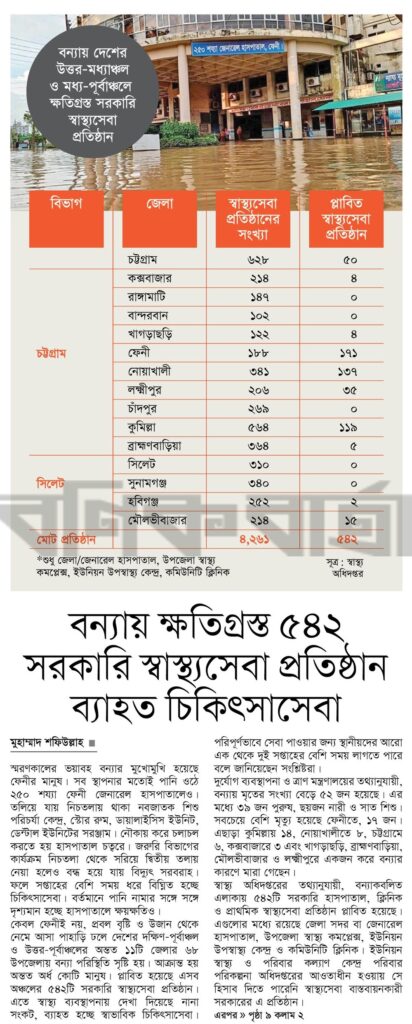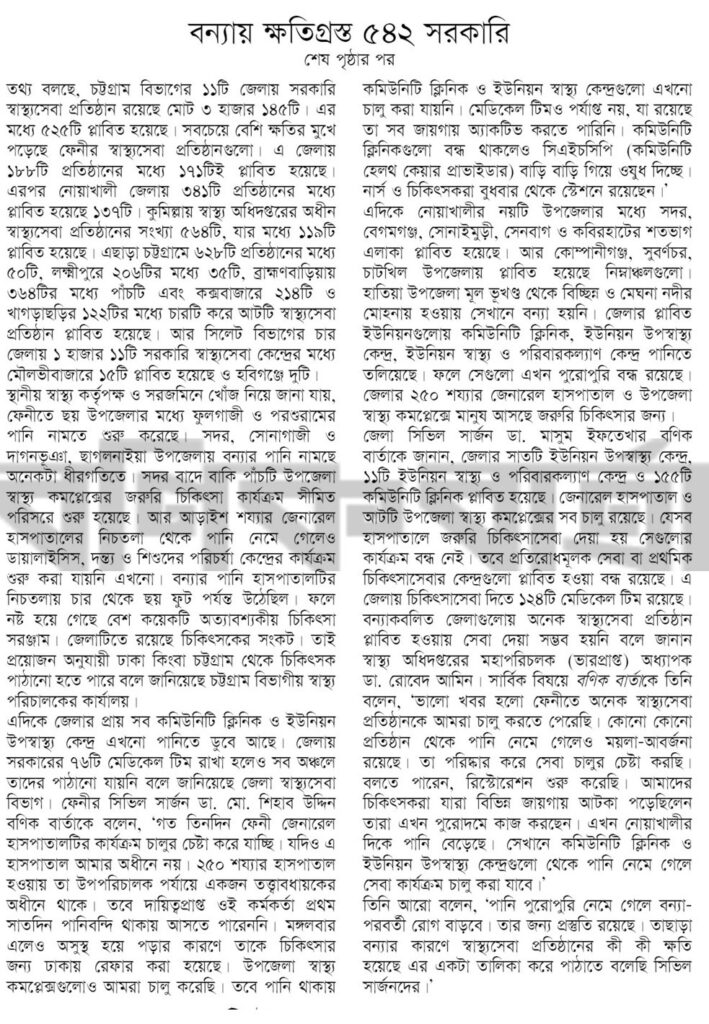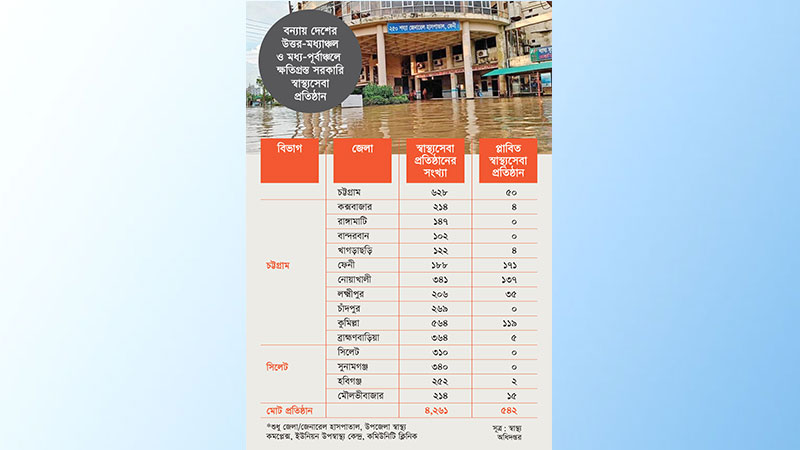The people of Feni are facing one of the worst floods in living memory. Like many other buildings, the 250-bed Feni General Hospital was also submerged. The neonatal care unit, storeroom, dialysis unit, and dental equipment on the ground floor were all flooded. Movement within the hospital premises required boats. Although the emergency department was relocated to the second floor, the power supply was cut off. As a result, medical services have been disrupted for over a week. As the water recedes, the extent of damage to the hospital is becoming visible.
The flood situation is not confined to Feni alone. Torrential rains and upstream mountain runoff have caused flooding in at least 68 upazilas across 11 districts in the southeastern and northeastern regions of the country. Approximately 5 million people have been affected, and 542 government health facilities in these regions have been flooded. This has led to a crisis in the healthcare system, severely disrupting normal medical services. Local residents may need to wait another one to two weeks to receive full services, according to officials.
According to the Ministry of Disaster Management and Relief, the death toll from the floods has risen to 52, including 39 men, six women, and seven children. Feni has recorded the highest number of deaths, with 17 fatalities. Additionally, 14 people died in Cumilla, eight in Noakhali, six in Chattogram, three in Cox’s Bazar, and one each in Khagrachari, Brahmanbaria, Moulvibazar, and Lakshmipur.

The Directorate General of Health Services (DGHS) reported that 542 government hospitals, clinics, and primary healthcare facilities in the flood-affected areas have been submerged. These include district headquarters or general hospitals, upazila health complexes, union health sub centers, and community clinics. The DGHS could not account for union health and family welfare centers, which fall under the jurisdiction of the Directorate General of Family Planning. According to the data, the Chattogram Division has a total of 3,145 government health facilities, of which 525 have been flooded. The health facilities in Feni have suffered the most, with 171 out of 188 facilities flooded. In Noakhali, 137 out of 341 facilities were flooded, while 119 out of 564 were affected in Cumilla. Additionally, 50 out of 628 facilities in Chattogram, 35 out of 206 in Lakshmipur, five out of 364 in Brahmanbaria, and four out of 214 in Cox’s Bazar and four out of 122 in Khagrachari were flooded. In the Sylhet Division, 15 out of 1,011 government health centers were submerged in Moulvibazar, while two were affected in Habiganj.
Local health authorities and on-site investigations revealed that in Feni, the water has started to recede in Fulgazi and Parshuram upazilas. In Sadar, Sonagazi, Daganbhuiyan, and Chhagalnaiya upazilas, the water is receding more slowly. Emergency medical services have resumed on a limited scale at health complexes in five upazilas, except for the Sadar upazila. Although the water has receded from the ground floor of the 250-bed general hospital, the dialysis, dental, and neonatal care units have not yet resumed operations. Floodwaters had risen to between four and six feet on the ground floor of the hospital, damaging several essential medical devices. The district is also facing a shortage of doctors, and additional doctors may need to be sent from Dhaka or Chattogram, according to the Chattogram Divisional Health Director’s Office.
Meanwhile, nearly all community clinics and union health sub centers in the district remain underwater. Although the government has deployed 76 medical teams in the district, the local health department has reported that it has not been possible to send them to all areas. Dr. Md. Shihab Uddin, Feni’s Civil Surgeon, told Bonik Barta, “We have been trying to restore operations at Feni General Hospital for the last three days, even though the hospital is not under my jurisdiction. Being a 250-bed hospital, it is managed by a superintendent at the deputy director level. However, the responsible official was unable to come as he was stranded due to the floodwaters for the first seven days. Although he arrived on Tuesday, he fell ill and had to be referred to Dhaka for treatment. We have also resumed operations at the upazila health complexes. But community clinics and union health centers remain closed due to the water. We also do not have enough medical teams, and those we do have are not yet fully operational. Although the community clinics are closed, the Community Health Care Providers (CHCPs) are distributing medicines door-to-door. Nurses and doctors have been stationed since Wednesday.”

In Noakhali, among the nine upazilas, the entire areas of Sadar, Begumganj, Sonaimuri, Senbug, and Kabirhat have been flooded. The low-lying areas in Companiganj, Subarnachar, and Chatkhil upazilas have also been submerged. Hatia upazila, which is isolated from the mainland and located at the Meghna River estuary, has not been affected by the flood. The community clinics, union health sub centers, and union health and family welfare centers in the flooded unions of the district have been submerged, leaving them entirely non-functional. People are coming to the 250-bed general hospital and the upazila health complexes for emergency treatment.
Dr. Masum Iftekhar, Noakhali’s Civil Surgeon, informed Bonik Barta that seven union health sub centers, 11 union health and family welfare centers, and 155 community clinics in the district have been flooded. All general hospitals and eight upazila health complexes remain operational. Emergency services at hospitals have not been suspended, but preventive or primary healthcare centers that have been flooded are closed. There are 124 medical teams available to provide healthcare services in the district.
Professor Dr. Robed Amin, the Acting Director General of DGHS, stated that it has not been possible to provide services at many health facilities in the flood-affected districts due to the inundation. He told Bonik Barta, “The good news is that we have managed to resume operations at many health facilities in Feni. Even though water has receded from some facilities, debris remains. We are working to clean them up and restore services. You could say that the restoration process has begun. Our doctors who were stranded in various places are now working at full capacity. Meanwhile, the water level in Noakhali is rising. Once the water recedes from the community clinics and union health sub centers, we will be able to resume services there.”
He added, “We are preparing for an increase in post-flood diseases once the water recedes completely. Additionally, we have asked the Civil Surgeons to compile a list of the damages to the healthcare facilities caused by the flood.”

